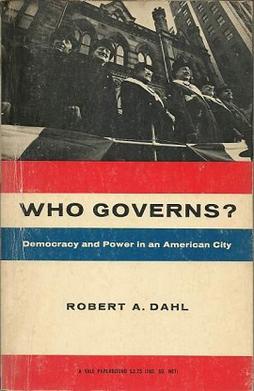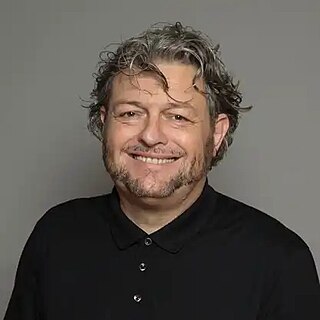
The People's Party for Freedom and Democracy is a conservative-liberal political party in the Netherlands. The VVD, whose forerunner was the Freedom Party, is a party of the centre-right that tries to promote private enterprise and economic liberalism.
Pluralism as a political philosophy is the diversity within a political body, which is seen to permit the peaceful coexistence of different interests, convictions, and lifestyles. While not all political pluralists advocate for a pluralist democracy, this is the most common stance, because democracy is often viewed as the most fair and effective way to moderate between discrete values.

Democratization, or democratisation, is the structural government transition from an authoritarian government to a more democratic political regime, including substantive political changes moving in a democratic direction.

Robert Alan Dahl was an American political theorist and Sterling Professor of Political Science at Yale University.
Arend d'Angremond Lijphart is a Dutch-American political scientist specializing in comparative politics, elections and voting systems, democratic institutions, and ethnicity and politics. He is Research Professor Emeritus of Political Science at the University of California, San Diego. He is influential for his work on consociational democracy and his contribution to the new Institutionalism in political science.
In political science, the term polyarchy was used by Robert A. Dahl to describe a form of government in which power is invested in multiple people. It takes the form of neither a dictatorship nor a democracy. This form of government was first implemented in the United States and France and gradually adopted by other countries. Polyarchy is different from democracy, according to Dahl, because the fundamental democratic principle is "the continuing responsiveness of the government to the preferences of its citizens, considered as political equals" with unimpaired opportunities. A polyarchy is a form of government that has certain procedures that are necessary conditions for following the democratic principle.
Modernization theory or modernisation theory holds that as societies become more economically modernized, wealthier and more educated, their political institutions become increasingly liberal democratic. The "classical" theories of modernization of the 1950s and 1960s, most influentially articulated by Seymour Lipset, drew on sociological analyses of Karl Marx, Emile Durkheim, Max Weber, and Talcott Parsons. Modernization theory was a dominant paradigm in the social sciences in the 1950s and 1960s, and saw a resurgence after 1991, when Francis Fukuyama wrote about the end of the Cold War as confirmation on modernization theory.

Abdolkarim SoroushPersian pronunciation:[æbdolkæriːmsoruːʃ]), born Hossein Haj Faraj Dabbagh, is an Iranian Islamic thinker, reformer, Rumi scholar, public intellectual, and a former professor of philosophy at the University of Tehran. He is among the most influential figures in the religious intellectual movement of Iran. Soroush is currently a visiting scholar at the University of Maryland in College Park, Maryland. He was also affiliated with other institutions, including Harvard, Princeton, Yale, Columbia, the Leiden-based International Institute as a visiting professor for the Study of Islam in the Modern World (ISIM) and the Wissenschaftskolleg in Berlin. He was named by Time magazine as one of the world's 100 most influential people in 2005, and by Prospect magazine as one of the most influential intellectuals in the world in 2008. Soroush's ideas, founded on relativism, prompted both supporters and critics to compare his role in reforming Islam to that of Martin Luther in reforming Christianity.

Giovanni Sartori was an Italian political scientist who specialized in the study of democracy, political parties, and comparative politics.
Charles Edward Lindblom was an American academic who studied economics at the University of Chicago and was Sterling Professor emeritus of political science and economics at Yale University. He served as president of the American Political Science Association and the Association for Comparative Economic Studies, as well as director of Yale's Institute for Social and Policy Studies.
Juan José Linz Storch de Gracia was a German-born Spanish sociologist and political scientist specializing in comparative politics. From 1961 he was Sterling Professor Emeritus of Sociology and Political Science at Yale University and later also an honorary member of the Scientific Council at the Juan March Institute. He is best known for his work on authoritarian political regimes and democratization.

Who Governs?: Democracy and Power in an American City is a book in American political science by Robert Dahl that was published in 1961 by Yale University Press. Dahl's work is a case study of political power and representation in New Haven, Connecticut. It is widely considered one of the great works of empirical political science of the 20th century.
Stein Rokkan was a Norwegian political scientist and sociologist. He was the first professor of sociology at the University of Bergen and a principal founder of the discipline of comparative politics. He founded the multidisciplinary Department of Sociology at the University of Bergen, which encompassed sociology, economics and political science and which had a key role in the postwar development of the social sciences in Norway.
Seyla Benhabib is a Turkish-born American philosopher. Benhabib is a senior research scholar and adjunct professor of law at Columbia Law School. She is also an affiliate faculty member in the Columbia University Department of Philosophy and a senior fellow at the Columbia Center for Contemporary Critical Thought. She was a scholar in residence at the Law School from 2018 to 2019 and was also the James S. Carpentier Visiting professor of law in spring 2019. She was the Eugene Mayer Professor of Political Science and Philosophy at Yale University from 2001 to 2020. She was director of the program in Ethics, Politics, and Economics from 2002 to 2008. Benhabib is well known for her work in political philosophy, which draws on critical theory and feminist political theory. She has written extensively on the philosophers Hannah Arendt and Jürgen Habermas, as well as on the topic of human migration. She is the author of numerous books, and has received several prestigious awards and lectureships in recognition of her work.

Henkjan Honing is a Dutch researcher. He is professor of Music Cognition at both the Faculty of Humanities and the Faculty of Science of the University of Amsterdam. He conducts his research under the auspices of the Institute for Logic, Language and Computation, and the University of Amsterdam's Brain and Cognition center.
In philosophy, political science and sociology, elite theory is a theory of the state that seeks to describe and explain power relationships in society. The theory posits that a small minority, consisting of members of the economic elite and policymaking networks, holds the most power—and that this power is independent of democratic elections.
Classical pluralism is the view that politics and decision-making are located mostly in the framework of government but that many non-governmental groups use their resources to exert influence. The central question for classical pluralism is how power and influence are distributed in a political process. Groups of individuals try to maximize their interests. Lines of conflict are multiple and shifting as power is a continuous bargaining process between competing groups. There may be inequalities but they tend to be distributed and evened out by the various forms and distributions of resources throughout a population. Any change under this view will be slow and incremental, as groups have different interests and may act as "veto groups" to destroy legislation. The existence of diverse and competing interests is the basis for a democratic equilibrium, and is crucial for the obtaining of goals by individuals.
Glen Francis Newey was a political philosopher, last acting as a Professor of Practical Philosophy at the University of Leiden. He previously taught in Brussels at the Université Libre de Bruxelles and until 2011 was Professor in the School of Politics, International Relations & Philosophy at Keele University, Staffordshire, England. He was a prominent member of the "Realist" school of political philosophers which also includes such figures as Bernard Williams, John N. Gray, and Raymond Geuss. Newey also wrote extensively about toleration, casting doubt on whether it remains a coherent political ideal in modern liberal-democratic societies.
Criticism of democracy, or debate on democracy and the different aspects of how to implement democracy best have been widely discussed. There are both internal critics and external ones who reject the values promoted by constitutional democracy.






